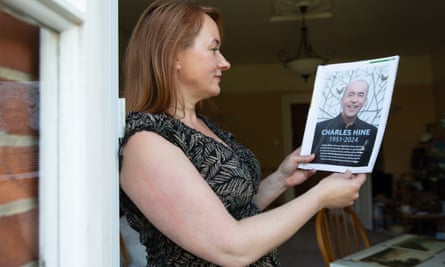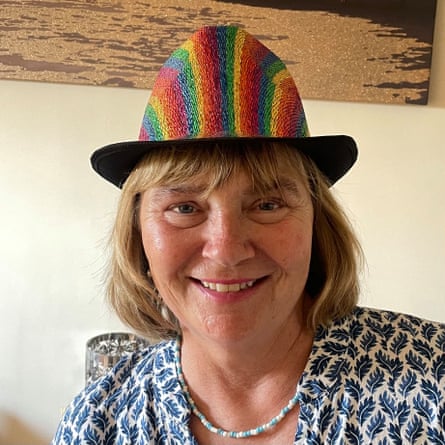Up to 100,000 people in England may be living with undiagnosed forms of dementia that present with symptoms such as depression and hallucinations, according to government figures.
Dementia is an umbrella term for many different conditions, affecting more than 55 million people worldwide. In England, about 7,000 people are diagnosed every month. While the health service has made progress in headline diagnosis rates, latest figures show that under-diagnosis of specific dementias remain a problem.
NHS data published for the first time on Thursday shows the prevalence of two less common forms of the condition, dementia with Lewy bodies and frontotemporal dementia.
In 2023, the NHS started publishing how many patients have Alzheimer’s, vascular and mixed dementias. The data did not specify how many had dementia with Lewy bodies or frontotemporal dementia, instead recording those figures in the “other” category, which includes those whose specific form of dementia is undiagnosed.
Dementia with Lewy bodies (which includes Parkinson’s dementia) is estimated by the National Institute for Health and Care Excellence to account for 10% to 15% of dementias. The NHS primary care dementia figures, released on Thursday, suggest that between 73,000 and 109,000 people over 65 in England have dementia with Lewy bodies, but only 15,000 have a recorded diagnosis.
Just under 15,000 people are thought to have frontotemporal dementia, but barely 3,000 are formally diagnosed. That means that up to 100,000 patients with these two forms of dementia are undiagnosed.
The effects of these conditions are different from Alzheimer’s disease and vascular dementia. Symptoms of dementia with Lewy bodies can include depression, apathy and hallucinations, alongside classic symptoms of Parkinson’s, which require different treatment and care planning.
It took three years for Charles Hine to be diagnosed with Lewy body dementia. The musician and conductor went to the GP in 2017 when he couldn’t remember how to use the central heating. “Charles knew something was wrong,” his wife, Kerry, said. He had no problem with his short-term memory, which seemed to have been the only thing the doctor considered, she recalled.
It wasn’t until 2019 that the GP referred him to a memory clinic, but the MRI scan came back clear and Charles was diagnosed with mild cognitive impairment. Eventually, in 2020, aged 69, Charles had another psychometric test and they diagnosed probable dementia with Lewy bodies. “By this stage, he really felt the cold, couldn’t remember how to email, and had difficulties processing visual information. His balance was going and he became increasingly anxious and upset,” Kerry said.
“I’d already had to get sensor lights, put a crash mat by our bed and put alarms on the doors.”

Charles continued to deteriorate and died on 1 January 2024. Kerry said her advice for those who suspected they or a loved one may have a less common form of dementia was: “Don’t take no for an answer”.
“Tell the doctor you don’t think testing short-term memory is enough and ask for a referral to a specialist,” she added.
Frontotemporal dementia accounts for 2% of dementias, but this rate is thought to be higher in younger people. Symptoms include personality and behavioural changes and difficulty speaking. The actor Bruce Willis has this form of dementia.
Tracey Lane was diagnosed with frontotemporal dementia when she was 51. “I had started finding passwords and faces confusing,” she said. “But I also kept thinking I wanted to leave the world, which is just horrible when I have a wonderful husband and two lovely boys, but I couldn’t help it.”

Getting a diagnosis was a relief. “It was good to actually find out what was going on.” Now 57, Lane struggles to recognise people and struggles with her mental health if she is alone or has nothing to do. Her advice to others with the condition was to keep active. “There are some positive things you can do still,” she said.
The NHS figures show that 207,135 patients have Alzheimer’s and 75,920 have vascular dementia, accounting for more than half of all diagnoses. But a third of patients, nearly 155,000 people, are listed as “other” or “inconclusive” dementia.
That means they either have an even rarer form of dementia or it is not known what form they have, meaning they are not receiving tailored treatment and care to reflect their different pathologies, prognoses and symptoms.
James White, the head of national influencing at Alzheimer’s Society, said diagnosis rates were unacceptable.
“Around one million people are living with dementia in the UK and it’s the UK’s biggest killer,” he said. “Yet these figures show that there is a worrying gap between the thousands of people living with frontotemporal dementia and dementia with Lewy bodies in England, and those that have been diagnosed.
“The new government must prioritise dementia by increasing diagnosis rates and setting new ambitious targets. It can’t be right that a third of people in England living with dementia don’t have a diagnosis.”
Rachel Thompson, a consultant admiral nurse for Lewy body dementia, said: “Carers and families supporting people with Lewy body dementia need access to specialist support and advice, which puts further importance on a correct diagnosis.”
She also called for improved understanding among healthcare professions of how Parkinson’s can present alongside Lewy body dementia, to ensure people living with the condition received the right treatment and advice.
NHS England has been approached for comment.
Source: theguardian.com


















